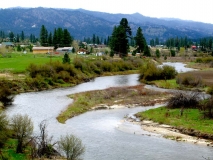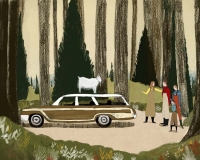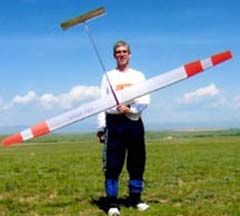No products in the cart.
Tangled Lines
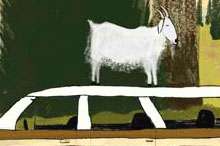
An Angling Tale
By Peter D. McQuade
This story is available in its entirety free of charge for the first part of November.
I came of age in the Idaho of the 1960s, in the company of six siblings, all of whom had inherited our parents’ passionate devotion to the outdoors.
Fishing was one of our favorite, most adventurous family pastimes. Beyond the thrilling prospect of reeling in a feisty rainbow trout, nearly every one of our forays into the forests offered an unexpected, unforgettable life experience. Here I offer one of those experiences, in the form of an ostensibly improbable yet true story, with the hope that today’s fishing community will be better prepared for such adversity than we were. And more able to keep a straight face.
Crouch (population 162 in the 2010 census) is one of those Gem-State jewels that fishing enthusiasts would keep secret if they could. Set in lush meadows cradled by rolling, pine-forested hills in the mountains of the Boise National Forest, there’s never been a more picturesque hamlet anywhere. A couple of miles southwest of the town, the Middle and South Forks of the Payette River join forces, and just downstream of this confluence sat Dad’s secret fishing spot. In 1962, this fenced-in stretch of idyllic riverbank belonged to a generous rancher who had given his blessing for our family to occasionally fish there. Situated along the sweep of a wide bend in the babbling river, it wasn’t far from the highway, but was well hidden from it by a rampart of thick brush and small trees. The water flowed steadily but not hurriedly there, where trout flourished and freshwater clams dotted the sandier areas of the river bottom. Occasionally, a wild otter would frolic in the stream, oblivious to our intrusions. A perfect place for a tranquil day of angling and basking in the valley’s verdant beauty. Magnificent therapy for body and soul.
At least it was on most occasions. One particular summer day stands out as a wry counterexample. Our brown-and-white sedan pulled up to our usual parking place and we stepped out into a gloriously warm and sunny day. Soon, Dad, Mom, and the older boys—Bob and Joe—had donned their waders and ventured into the middle of the river. Will and I, the youngest kids, stayed on the bank, dabbling happily but lucklessly with a couple of Dad’s old rods. Somewhere in that long day of sleepy serenity, someone left one of the car’s rear doors open. And that, as the poet said, made all the difference.
View of Crouch. Steve Bunk photo.

Illustration by Adam Turner.
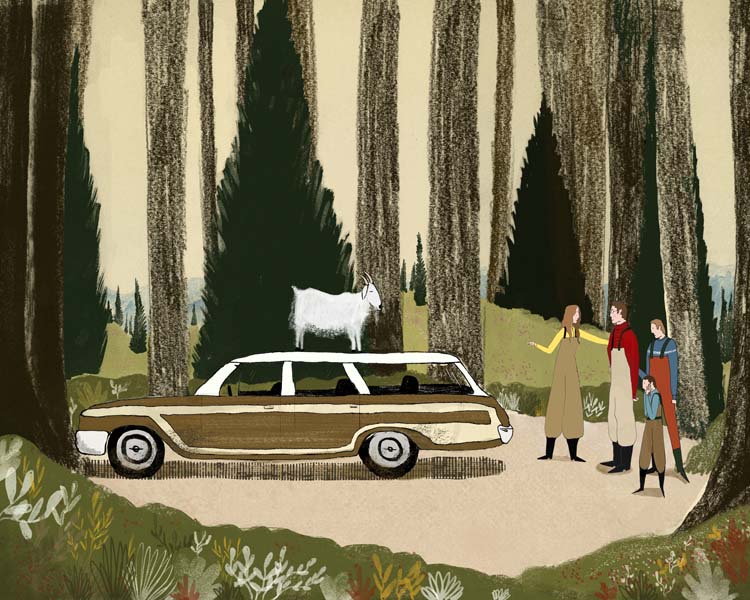
Eventually, Mom called out that it was time to go home. We gathered up our gear and reluctantly ambled toward the car. Upon reaching it, Bob shrieked, “There’s something in the car . . . It’s a goat!”
Dad and Mom double-timed to the scene. From a safe distance, Dad bent and peeked inside. A large, scraggly white-and-gray goat lounged on the back seat, comfortable and self-satisfied, its legs tucked neatly under its belly.
Dad moaned. “The rancher said he had a few animals here. But . . .”
Mom seemed to be sobbing in sympathy, but they were the tears of a woman struggling to contain her laughter.
“All right, I’ll need some help getting him out,” Dad groaned. “Bob, Joe, please give me a hand. Will and Pete, stay with Mother, out of the way.”
“Is it . . . dangerous?” Mom ventured.
“I don’t think so,” Dad replied with a tenuously confident set to his jaw. “What else can we do?”
“Will he kick?” she asked.
Dad shrugged. He cautiously opened the other rear door. For a tense second or two, the goat glared at him, face-to-face. Dad hastily returned to the other side, where the family waited in awe. “When I say go, the three of us will push his backside. He’ll jump out of there, so be careful.”
Everyone agreed this plan made sense. Except the goat, who must have taken obedience training from a mule. Dad, Bob, and Joe made ready. They counted to three—then push, push, push. Grunting and yelling were thrown in for dramatic effect. But the goat found no reason to yield to this challenge to his claim on the cozy, shady spot. Pushing and yelling were applied again, with more sincere effort. The immovable goat seemed to bask in the escalating attention.
Mom, a kindergarten teacher, began to sing a children’s song. “Bill Grogan’s goat was feeling fine. Ate three red shirts, right off the line.”
Pretending he didn’t hear, Dad removed his glasses and wiped his brow with a handkerchief, sighing heavily. Mom stopped singing. Instead, she frowned to show she was really more concerned about Dad straining his back than about the goat. The trio tried again. Nothing. In his frustration, Dad finally let loose a chuckle. Undoubtedly, the goat took this as a sign of surrender and felt he’d had his fill of the rude interruption to his nap. With an unmelodious yelp, he shot out the far door and jerked to a dusty halt a short distance from the car. His silent pose was both noble and indignant.
Dad stretched across the back seat and pulled the door shut. A few seconds later, he emerged, the glow of victory beaming from his suntanned face. The car now shielded the family from the defiant beast. Regaining control of the situation, he said, “He’ll be all right. Let’s get our things packed and be on our way.”
No sooner had we turned our backs than a loud clattering, scratching, and screeching jerked our attention back to the car. “What?” we all shouted.
The battle was far from over—at least in the mind of the goat, whose keen survival instincts urged him to higher ground. In a split second, he’d scaled the hood, charged up the slope of the windshield, and was now standing proudly atop the car’s snow-white roof. He paced around a bit, taking stock of his new domain. “You may have the back seat if you insist,” he seemed to be saying. “The rest of this infernal contraption is mine.” At first, he was skeptical of the slippery surface as his hooves sought stability, but otherwise, he found the perch quite satisfactory.
We all nearly fell to the ground laughing. The loudest guffaws were Dad’s. “I can’t believe this is happening,” he said. “What am I supposed to do now?” I’m sure he was picturing our car cruising Highway 55 with a triumphant goat crowning the top.
Mom regained her composure enough to observe that it was a pity we didn’t have a camera with us. Then she said we should all ignore the goat. He was having too much fun with us. “Just get your things together and we’ll prepare to go home.” So began a war of nerves, with goat and people self-consciously pretending the other didn’t exist.
Eventually, confident he’d made his point and concluding that human comforts just weren’t worth the effort, the goat leaped down and scampered into the bushes. We all looked at each other with a silent, “Did that really just happen?” look on our faces.
We’d learned a lesson, though none of us knew quite how to frame it. We finally got home to Boise that evening, tired and sunburned. Fran, our older sister who’d stayed home that day, greeted us at the carport door. “What did you catch?” she asked. Dad grinned, his brows arched above twinkling Irish eyes.
As I now look back over these fifty-odd years, I think I know the unspoken answer that danced on his lips that moment. “You should have seen the one that got away.”
This content is available for purchase. Please select from available options.
Register & Purchase Purchase Only
Register & Purchase Purchase Only

